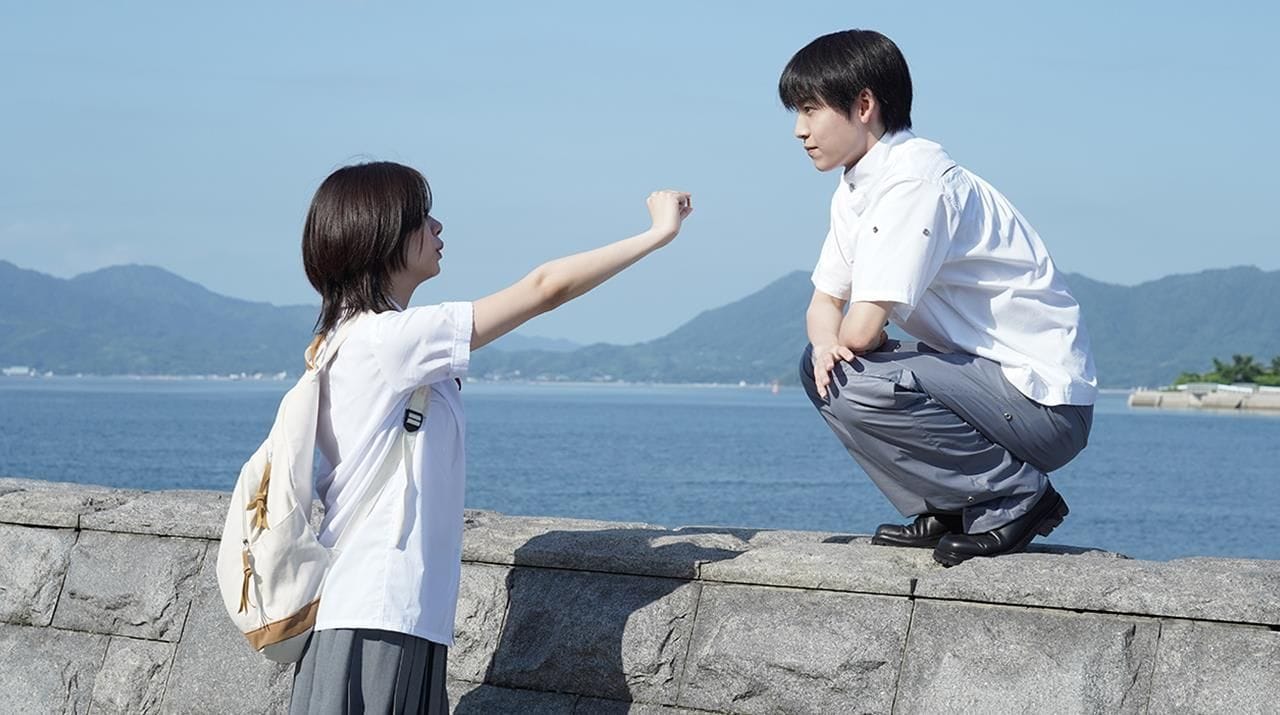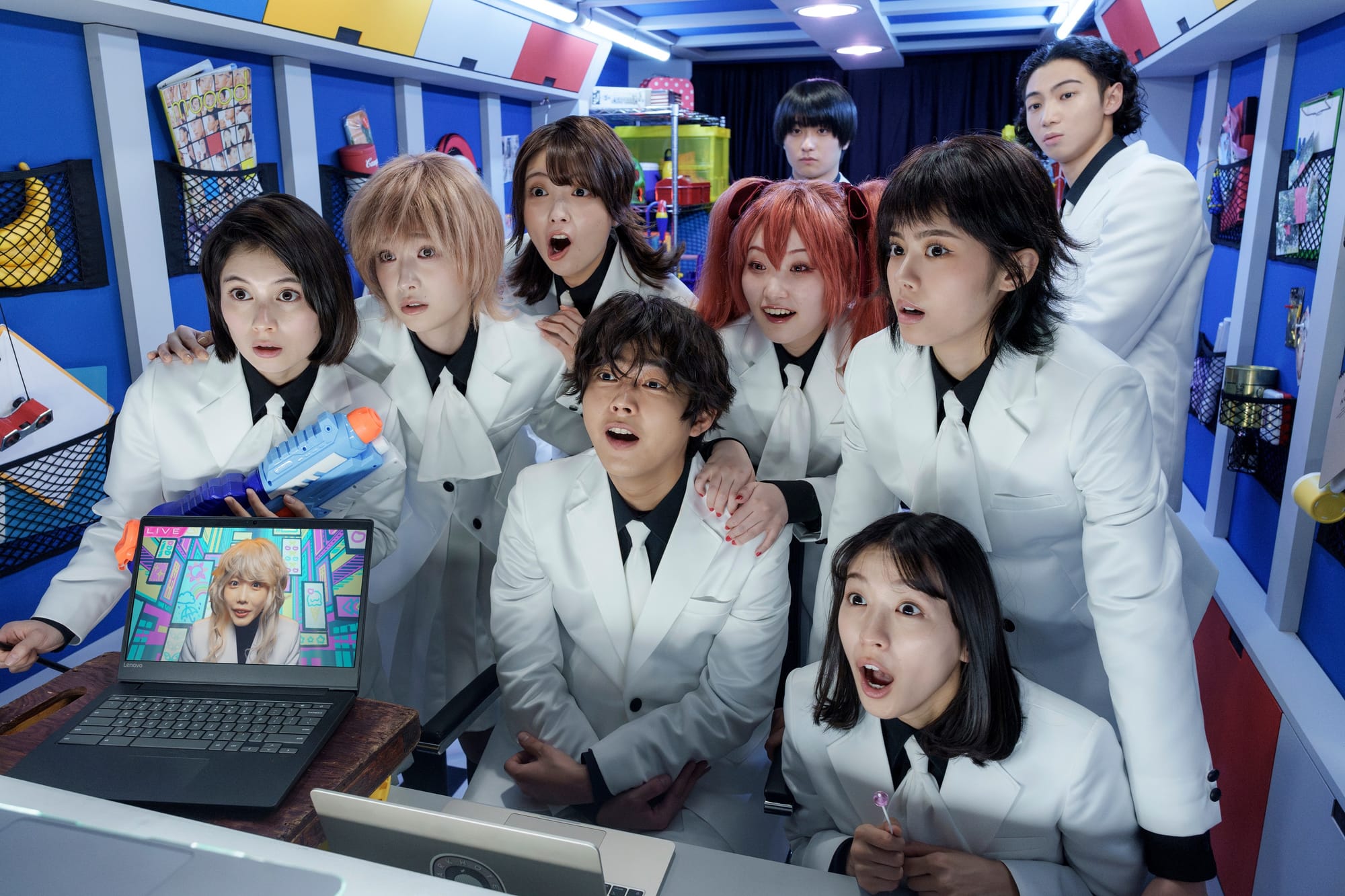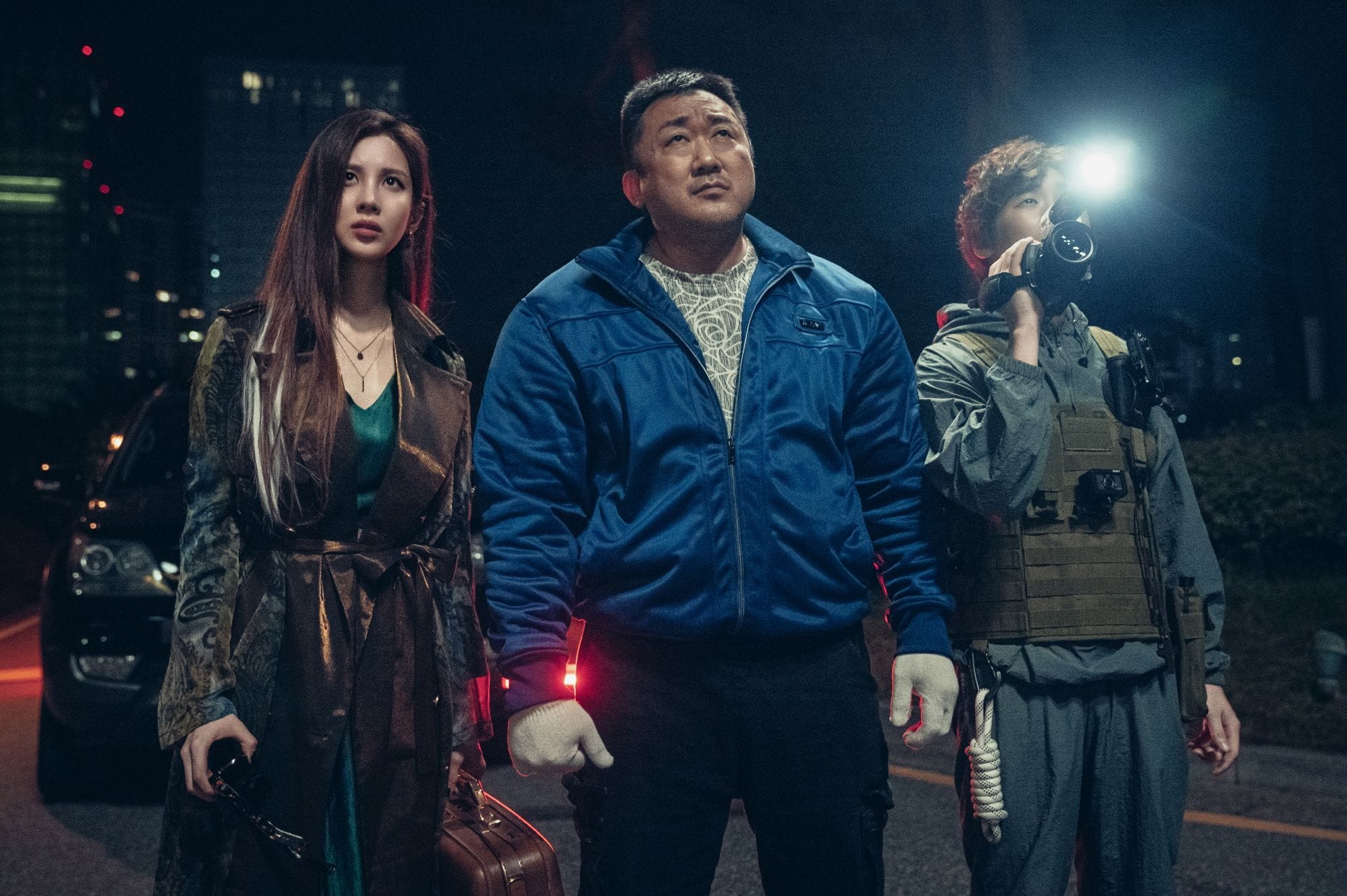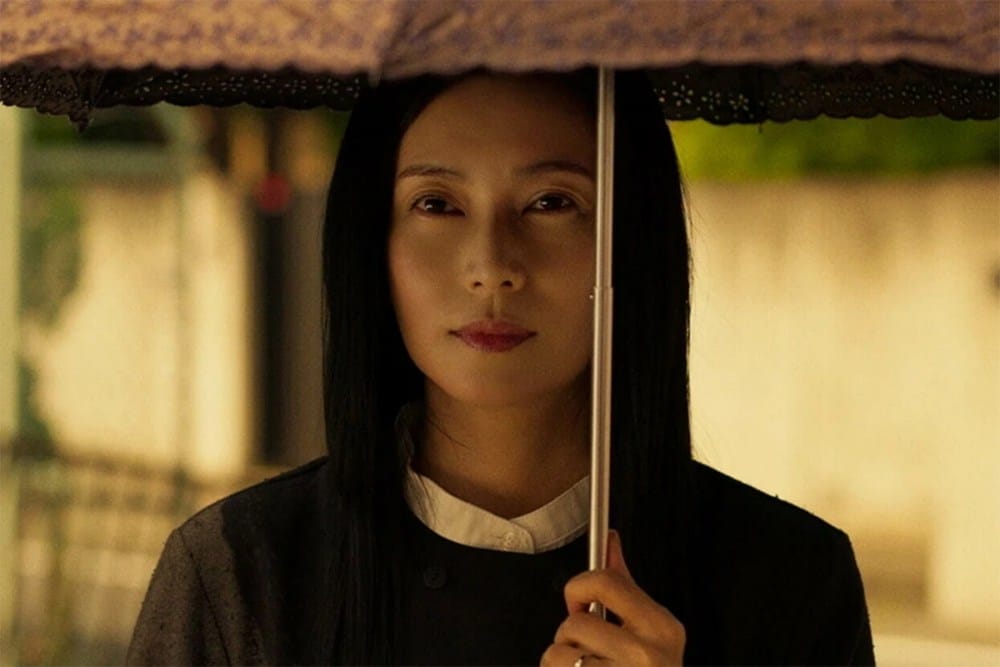Fantasia Festival 2025
Reviews of Rewrite, Honeko Akabane's Bodyguards, Holy Night: Demon Hunters, and Sham

The following reviews were original published in a slightly different form as part of the Fantasia Festival coverage at InReview Online.
Rewrite (Matsui Daigo, 2025) - July 26, 2025
This one’s for all the Obayashi heads out there. Matsui Daigo’s Rewrite begins in a place we know well: a high school girl named Miyuki learns that the new transfer student (Yasuhiko) is actually a time traveler from 300 years into the future. The two of them, bonding over this secret, spend a magical twenty days together before he must inevitably return to his own time. Before he goes, she learns (after briefly visiting herself in ten years time) that she will write a book about their time together, and that the boy will someday read this book and that will inspire his journey. All she has to do is write the book and in ten years time, the time loop will be perfect. And so she does, and when the inevitable day arrives. . . nothing happens. This is the first twenty minutes of Rewrite, the rest of the film follows Miyuki as she attempts to understand what happened (or didn’t happen) and why.
This scenario is obviously inspired by The Girl Who Leapt Through Time, a novel by Tsutsui Yasutaka from 1967 which was adapted into film by Obayashi Nobuhiko in 1983. It’s had a bunch of other adaptations since, on both television, stage, and film, including a celebrated anime by Hosada Mamoru (which is actually a sequel to the original story, though it follows basically the same structure), but Rewrite seems most inspired by Obayashi’s interpretation. The title of the book Miyuki writes is “Girl Leaps Time;” the film is set in Obayashi’s hometown of Onomichi, the setting for a number of his greatest movies, including The Girl Who Leapt through Time, which is as much a showcase for his beloved home as it is a sci-fi teen romance; and there are multiple references to the air around the time-traveler being filled with a faint scent of lavender, a running motif of Obayashi’s adaptation.
But more than mere homage, the complications of the time loop that Matsui and screenwriter Ueda Makoto (the modern master of time travel narratives behind Beyond the Infinite Two Minutes and River, here adapting a novel by Hojo Haruka) spin far beyond simple sci-fi mechanics into questioning the very idea of authorship, both of novels and films (and film adaptations of novels and other films), but of our own memories. It would spoil too much to go into details at this point, so it’ll have to suffice it to say that every twist and turn of Rewrite had me delighted, opening up new ways to understand not just the facts of the film’s world, but what it means to live in a reality mediated by stories that can change and disappear and remake (ahem, rewrite) themselves with or without our knowledge. For as much as Matsui locks us down in space, the Onomichi of our memory of another person’s story, he sets us adrift in time. Not drifting between possible futures or alternate presents, but into a past that contains as many possibilities as there are people to experience it.

Honeko Akabane's Bodyguards (Ishikawa Junichi, 2024) - July 26, 2025
A young man named Ibuki (played by multi-hyphenate star Raul), styled as a “bad boy” because of, I guess, his dyed-blonde hair and dangling earrings, is recruited by the mysterious head of a Japanese CIA-like organization to protect his high school-aged daughter Honeko (model-turned actress Deguchi Natsuki), who has been targeted for assassination by every criminal organization in the country and also happens to be Ibuki’s childhood friend. The hitch is that she doesn’t know anything about her real father (she was given up for adoption) and can’t know that she’s being protected or that people are trying to kill her. The other hitch is that every other kid in her class is also a bodyguard trained to protect her.
This is the irresistible starting point for this adaptation of Masamitsu Nigatsu’s manga, a sturdy structure for serialized storytelling (every new gang attack leading to a new story arc, while the audience gets to know the two dozen or so bodyguards and the inevitable fitful romance between Ibuki and Honeko sees its inevitable ups and downs—you could easily see this as a 50 episode anime series) condensed down to two hours. Director Ishikawa Junichi, a twenty year veteran of television (both series and movies) as well as film, does a fine job of capturing the energy of a serial, though he is inevitably limited by the running time. We get to know few of the characters outside the two leads, and even they are reliant on genre code signifiers more than creating unique personalities. Ibuki’s bad boy image is quickly dispensed with as he realizes he’s in way over his head, both with the other bodyguards (who are all more experienced than him) and Honeko (who really doesn’t have much of a personality beyond being a nice kid who happens to be the Cutest Girl in the World). But the film is bursting with energy, rushing from one story to the next with only a few moments to spare for the heartbreaks and frustrations of teen romance.
Most of the fun comes with the discovery of the other bodyguards, all of whom are introduced with comic book style splash pages announcing their names and specialties. There’s a karate girl, a ninja, a master of disguise, a hacker, a girl who’s really into torturing people, an engineer who pilots a robotic mascot suit, you know, typical high school stereotypes. They’re lead by a master strategist, who’s played by Okudaira Daiken, who played the surprisingly capable assistant in Kurosawa Kiyoshi’s Cloud. The interplay between the kids is a lot of fun, and the high school relationship tropes played more or less straight effectively balance the gleeful anarchy of the film’s fight sequences.
We’ve had a lot of oddball action comedies in the last few years, but few have been able to pull-off the the mix between fun fights and quirkiness without either compromising the choreography of the action or overplaying the cutesy goofiness into simply being annoying. Your mileage may vary on that kind of thing of course (there are, for example, some benighted souls out there who find the Baby Assassins insufferable—we must pity them), but Hideko Akabane’s Bodyguards finds a breezy middle ground, never as edgy or truly weird as say, Takashi Miike’s Ace Attorney, but a whole lot more tolerable than the Kitty the Killers or Gunpowder Milkshakes of the world.

Holy Night: Demon Hunters (Lim Dae-hee, 2025) - August 3, 2025
The most reliable formula in action cinema today is having Ma Dong-seok one-punch a bunch of anonymous stuntmen into a wall. After hitting it big (so to speak) in 2016 with Train to Busan, the man also known as Don Lee has been brawling his way into our hearts with the likes of The Roundup series (three sequels to his 2017 The Outlaws with another one on the way), Badland Hunters, and even a foray into the MCU with The Eternals. This year’s Ma vehicle is Holy Night: Demon Hunters which dares to ask the question: can even the armies of Satan himself withstand the blows of Ma Dong-seok’s mighty fists?
Of course they cannot.
Ma stars as the brawny part of a trio of exorcists. While one of the team, Sharon (played by Seohyun, from the K-pop supergroup Girls’ Generation), does the actual exorcising by putting her hands on the victims’ forehead and chanting in a strange language, and the other one, played by Lee David (from Bong Joon-ho’s Mother and Lee Kwang-kuk’s underseen classic Romance Joe), hangs around in the background filming everything, Ma stands guard. As the forces of darkness, humans that may or may not also be possessed, come to prevent the exorcism, Ma punches them so hard their demon souls come flying out of their bodies. It is, like every Ma Dong-seok action sequence, both hilarious and extremely cool.
The world of Holy Night: Demon Hunters is an eclectic amalgam of religions, mostly Catholic Christianity of course, but with Eastern twists (bamboo fronds, magic mirrors), a mix that matches its tone, pitched somewhere between serious horror of the American exorcism genre and the gleeful silliness of Korean action cinema. The debut film from writer/director Lim Dae-hee, it feels less like a movie than an elaborate pilot for a TV series, something along the lines of Evil, but with more punching and less sex appeal.
The plot revolves around the apparent possession of a young woman whose sister, a neuropsychiatrist, begs the heroic trio for help. There are hints here of a possible skepticism towards the supernatural, but they’re as quickly banished as the anonymous bad guys who run into Ma’s beefy mitts. Instead, we’re whisked from one action scene to another, with flashbacks liberally thrown in to flesh out both the possession story and that of the three heroes. With these the film adopts a suitably creepy found footage approach, in contrast to the spectacular effects of the present day exorcism scenes. The heroes’ story seems more designed to set up future episodes than it is relevant to this movie, but the main plot is satisfactory enough and the whole thing just flies by at barely 90 minutes long.

Sham (Miike Takashi, 2025) - August 3, 2025
If anyone can make a great Cancel Culture movie, it would have to be Miike Takashi, right? Sham is based on a true story, a court case from 2003 in which a teacher is accused of severely abusing one of his nine-year-old students. The film begins with the boy’s mother’s courtroom testimony, as she describes the sequence of events: the teacher is racist, stating that the boy whose great-grandfather was American, of having “tainted” blood which explains his stupidity; the teacher physically punishes the boy for minor classroom infractions (pinching his nose until it bleeds, lifting him up by the ears until they tear); and finally, after having been reported to the school authorities, the teacher finds the boy alone on his way home from school and tries to persuade him to jump off a building. This occupies the first twenty minutes of the movie, a harrowing account told in horror movie style, with the teacher’s face obscured by deep shadows when it isn’t flashing a menacingly psychotic grin.
The next forty minutes then presents the teacher’s version of these events, and they could not possibly be more different: the teacher is a nice family man who looks out for and is loved by his students, is gentle with his corrections, and full of life, humor, and humility. The final hour follows the trial in which the truth is attempted to be discovered and established. Thus we have a variation on the Rashomon structure, with two competing versions of the same events. But unlike Kurosawa, who was interested in the nature of truth and how people tell lies, even to themselves, and how we can function in a world where that is the case, Miike’s concerns are less cosmic. It’s clear which version of the truth he believes in, right from the start. While the opening twenty minutes is a horror movie, with the teacher barely visible–buried within deep black shadows as he's intorduced, then the next forty are shot without the filter of genre, the naturalistically filmedstory of an ordinary man caught in a Kafka-esque sequence of accusations he is increasingly unable to defend himself against. This isn’t a movie about the impossibility of truth, it’s a movie about a man who is accused of abuse not being given the benefit of the doubt.
Given the on-going revelations of the #MeToo movement within the Japanese film industry, where such high profile filmmakers as Sono Sion and Sakaguchi Tak, among others, have been credibly accused of all kinds of harassment and abuse, it’s not encouraging to see a director of Miike’s obvious stature come out with a film that wants us to question whether we should, in fact, “believe women.” Which isn’t to say that Sham is not a good movie, it’s a terrific courtroom drama, a fine exercise in classical style from a man not known for making classical films of any kind. Coming on the heels of his boxing movie Blue Fight (aka Blazing Fists), it’s another surprising turn toward the conventional for Miike, without any of that film’s small concessions to the director’s oddball quirks. Other than the fact that it is exceptionally well-crafted, and Miike remains among the most supremely competent filmmakers of our time, it’s a movie that could probably have been made by anyone, even Hirokazu Kore-eda.
But as sturdy as it is, one must wonder why Miike chose to tell this story, at this time. Sham lacks any of the nuance or expressionism of Todd Field’s Tár, probably the only great film yet made about Cancel Culture, or the courtroom intensity of Justine Triet’s Anatomy of a Fall, nor are its performances on the level of Sandra Hüller, Cate Blanchett, or Swann Arlaud in those films. Gô Ayano (A Bride for Rip Van Winkle) plays the teacher at an increasingly high emotional register as he pleads for the truth, and Shibasaki Kô (Battle Royale) seemingly has only one note as the mother leveling the accusations. Cold and emotionless, she leaves no doubt which of these characters is truly abusive and homicidal, giving us even less room to imagine than Miike does.
In the end, Sham is a courtroom drama about how everyone (friends and coworkers, the media, the public at large, the legal system) is ready to believe the worst in people, regardless of the evidence, or lack thereof. It’s a true story: people do get falsely accused of things all the time. But it misses the point at issue in accusations of abuse: that narratives like the mother’s always get discounted, that institutions always protect their own, and that the public is always willing to turn a blind eye to the horrible things happening around them in favor of social stability. Cherry-picking a case like this one, and making a whole fancy movie about it, doesn’t refute any of those facts. The real question at issue in Sham, if we want to be generous to Miike, and I’m perhaps too inclined to do so because I’m a fan of his work in general, is not whether we can ever believe accusations of abuse, or if we should discount them more than we’re willing to, is how can we, as a society, construct a system wherein the truth can ultimately win out, where abusers will be punished and the innocent vindicated. The truly harrowing position of Sham is not that there’s no such thing as truth, but rather that there is truth, but we as a flawed people have yet to develop a system in which we can find it.
